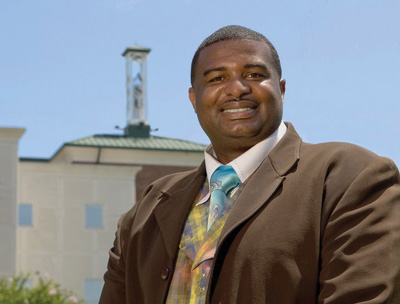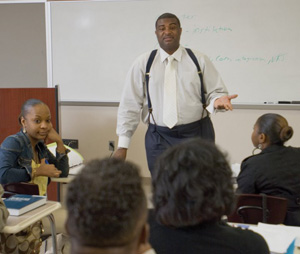Life-altering Event Becomes New Start
On June 9, 1990, Phillip Lewis’ life took what he first thought was a tragic twist, when a 14-year-old boy walked up to Lewis’ white Eclipse GSX and pointed a gun at the football player bound for the University of Memphis.
Lewis (PhD ‘04), then 20, had no intention of finding out if the gun-wielding youth wanted his sports car, his fancy jewelry, or his life. Lewis put the car in gear and took off, prompting the boy to pull the trigger.
That life-changing bullet blasted through Lewis’ right arm, by his chest and through his left arm.
At a moment like that, “you really connect with the reality of life,” Lewis said.
The tiny bullet and split second interaction had huge consequences: he suffered nerve damage in both hands that ended his football dreams and left him with a pins-and-needles sensation to this day. The shooting sent him in a different direction—academic instead of athletic.
Lewis, now 39, became the first man in his immediate family to graduate from college, but he didn’t stop there. He went on to earn a Ph.D. in Rehabilitation Counseling Education/Law Health Policy and Disability. Today he is the graduate coordinator of the Master’s in Rehabilitation Counseling program at Langston University–Tulsa campus.
Two decades ago, being in the wrong place at the wrong time left Lewis feeling hopeless, helpless, and even suicidal. “To say the least, I often was afraid to go out in public for a long time, which led to depression and post traumatic stress disorder,” he said.
 He resisted temptations that could have spun his life out of control. In high school, some of his teammates made $10,000 a week selling drugs. Dealers in his neighborhood always had the best clothes and cars, and the prettiest girls.
He resisted temptations that could have spun his life out of control. In high school, some of his teammates made $10,000 a week selling drugs. Dealers in his neighborhood always had the best clothes and cars, and the prettiest girls.
Lewis didn’t believe dealing drugs was the only way out of his neighborhood. He couldn’t betray the rock-solid support of his mother, Claudia Peterson. Ironically, Lewis was shot on her birthday.
“She reassured me it would be alright through prayers and God. That was support in itself,” Lewis recalled. “My mother helped me believe it would be OK even though I didn’t know how I would recover.”
Lewis, who was working two jobs and attending a community college to improve his grades at the time of the shooting, got straight A's at Rust College in Holly Springs, Miss. He earned a master’s degree from Southern Illinois University before coming to Iowa City for a doctorate.
At Iowa, Lewis experienced initial culture shock, but quickly established an adopted family that echoed his mother’s encouragement.
“It’s a unique environment, especially for someone from inner city Memphis,” Lewis said. “You think certain things will be problems, but they are not problems. Through the Graduate College, I received grants and scholarships. Ultimately, the external community was very important.”
Joe Henry, recruitment and outreach coordinator for the Graduate College’s Office of Graduate Ethnic Inclusion, reached out to Lewis. Henry observed a student who treated the bullet as a blessing in disguise.
“It gave him an opportunity to slow down his life and to reflect,” Henry said. “He shared with me that he did look internally at the life he was leading. The bullet gave him time to think about what he was doing.
“He is a person who enjoys life and has a passion for helping others. Those qualities make him successful and a survivor.”
The young man who Lewis believes shot him was tried but not convicted of the crime—today he’s serving time for an unrelated offense.
“I would like to confront the young man. Living a life of crime and being in and out jail, what does that lifestyle do for you?” Lewis said, taking the stance he often assumes in counseling other young people. “Clients try to make excuses for their behavior, I don’t buy into that.”
The shooting may have stolen Lewis’s dream of playing college football, but it also redirected his life in a big and positive way.
“I love being a rehabilitation counseling educator,” Lewis said. “It allows me the opportunity to train future rehabilitation counseling professionals, and to ultimately do my part to bridge the gaps in the delivery of rehabilitation counseling services in minority communities.”
![]()

![]()
